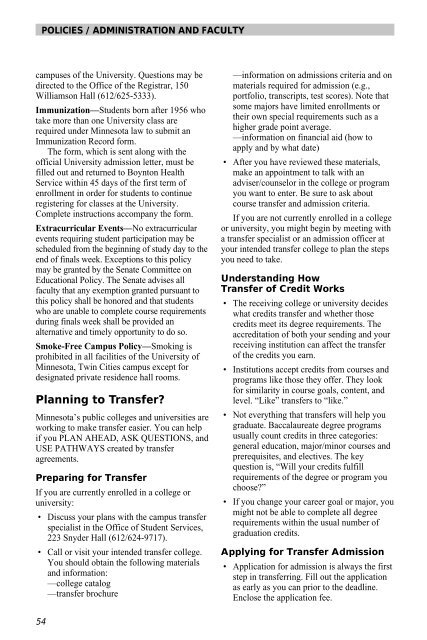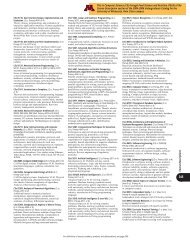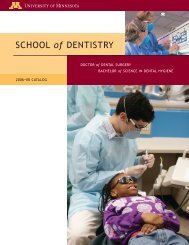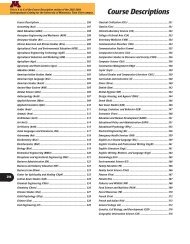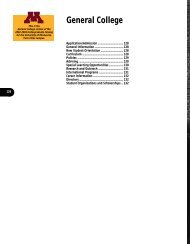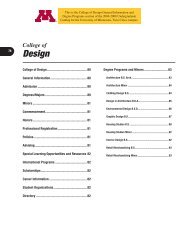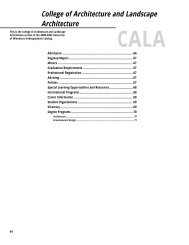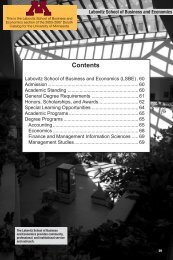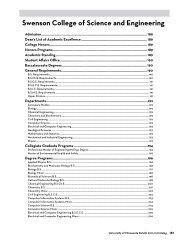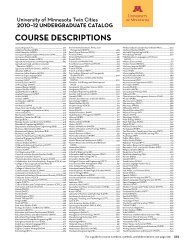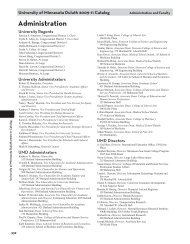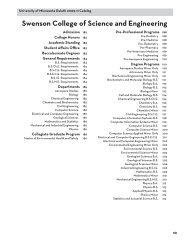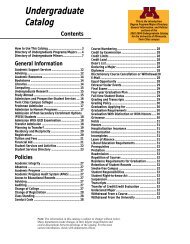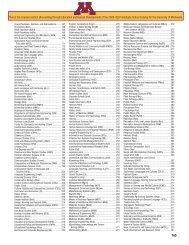R e s e a r c h a n d T e a c h i n g F a c i l i t i e s - University Catalogs
R e s e a r c h a n d T e a c h i n g F a c i l i t i e s - University Catalogs
R e s e a r c h a n d T e a c h i n g F a c i l i t i e s - University Catalogs
Create successful ePaper yourself
Turn your PDF publications into a flip-book with our unique Google optimized e-Paper software.
POLICIES / ADMINISTRATION AND FACULTY<br />
campuses of the <strong>University</strong>. Questions may be<br />
directed to the Office of the Registrar, 150<br />
Williamson Hall (612/625-5333).<br />
Immunization—Students born after 1956 who<br />
take more than one <strong>University</strong> class are<br />
required under Minnesota law to submit an<br />
Immunization Record form.<br />
The form, which is sent along with the<br />
official <strong>University</strong> admission letter, must be<br />
filled out and returned to Boynton Health<br />
Service within 45 days of the first term of<br />
enrollment in order for students to continue<br />
registering for classes at the <strong>University</strong>.<br />
Complete instructions accompany the form.<br />
Extracurricular Events—No extracurricular<br />
events requiring student participation may be<br />
scheduled from the beginning of study day to the<br />
end of finals week. Exceptions to this policy<br />
may be granted by the Senate Committee on<br />
Educational Policy. The Senate advises all<br />
faculty that any exemption granted pursuant to<br />
this policy shall be honored and that students<br />
who are unable to complete course requirements<br />
during finals week shall be provided an<br />
alternative and timely opportunity to do so.<br />
Smoke-Free Campus Policy—Smoking is<br />
prohibited in all facilities of the <strong>University</strong> of<br />
Minnesota, Twin Cities campus except for<br />
designated private residence hall rooms.<br />
Planning to Transfer?<br />
Minnesota’s public colleges and universities are<br />
working to make transfer easier. You can help<br />
if you PLAN AHEAD, ASK QUESTIONS, and<br />
USE PATHWAYS created by transfer<br />
agreements.<br />
Preparing for Transfer<br />
If you are currently enrolled in a college or<br />
university:<br />
• Discuss your plans with the campus transfer<br />
specialist in the Office of Student Services,<br />
223 Snyder Hall (612/624-9717).<br />
• Call or visit your intended transfer college.<br />
You should obtain the following materials<br />
and information:<br />
—college catalog<br />
—transfer brochure<br />
—information on admissions criteria and on<br />
materials required for admission (e.g.,<br />
portfolio, transcripts, test scores). Note that<br />
some majors have limited enrollments or<br />
their own special requirements such as a<br />
higher grade point average.<br />
—information on financial aid (how to<br />
apply and by what date)<br />
• After you have reviewed these materials,<br />
make an appointment to talk with an<br />
adviser/counselor in the college or program<br />
you want to enter. Be sure to ask about<br />
course transfer and admission criteria.<br />
If you are not currently enrolled in a college<br />
or university, you might begin by meeting with<br />
a transfer specialist or an admission officer at<br />
your intended transfer college to plan the steps<br />
you need to take.<br />
Understanding How<br />
Transfer of Credit Works<br />
• The receiving college or university decides<br />
what credits transfer and whether those<br />
credits meet its degree requirements. The<br />
accreditation of both your sending and your<br />
receiving institution can affect the transfer<br />
of the credits you earn.<br />
• Institutions accept credits from courses and<br />
programs like those they offer. They look<br />
for similarity in course goals, content, and<br />
level. “Like” transfers to “like.”<br />
• Not everything that transfers will help you<br />
graduate. Baccalaureate degree programs<br />
usually count credits in three categories:<br />
general education, major/minor courses and<br />
prerequisites, and electives. The key<br />
question is, “Will your credits fulfill<br />
requirements of the degree or program you<br />
choose?”<br />
• If you change your career goal or major, you<br />
might not be able to complete all degree<br />
requirements within the usual number of<br />
graduation credits.<br />
Applying for Transfer Admission<br />
• Application for admission is always the first<br />
step in transferring. Fill out the application<br />
as early as you can prior to the deadline.<br />
Enclose the application fee.<br />
54


